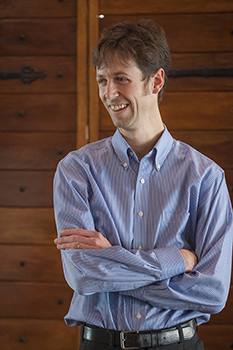Latest News Archive
Please select Category, Year, and then Month to display items
18 October 2021
|
Story Dr Nitha Ramnath

Our podcast guest
Prof Jeandrew Brink holds the post of Associate Professor in the Department of Mathematics and Applied
Mathematics within the Faculty of Natural and Agricultural Sciences at the University of the Free State. Her areas of interest include an analytical interest in Einstein field equations, dynamical systems, algorithms for testing general relativity
and the no-hair theorems, black holes, and gravitational waves. Prof Brink registered for a Bachelor of Sciences in 1998, continued with honours studies in 1999, and completed her master’s degree in 2000. Prof Brink’s research is on various
theoretical aspects of testing general relativity. She is a member of the MeerKAT telescope team that times and detect pulsars. She is also working with members of the Laser Interferometer Gravitational-Wave Observatory (LIGO) to find ways of using
gravitational waves to test Einstein’s theory.
Prof Brink was involved in the compilation of a video of geodesic orbits around a Manko-Novikov singularity, selected to be part of a Starmus 3 concert, the proceeds of which went towards promoting the Stephen Hawking Medal for Science Communication and
to support the charitable activities of the Stephen Hawking Foundation. It could also be part of a subsequent documentary.
Listen to the podcast at
François van Schalkwyk and Keenan Carelse,
UFS alumni leading the university’s United
Kingdom Alumni Chapter, have put their voices together to produce and direct the podcast series. Intended to reconnect alumni with the university and their university experience, the podcasts will be featured on the first Monday of every month,
ending in November 2021. Our featured alumni share and reflect on their experiences at the UFS, how it has shaped their lives, and relate why their ongoing association with the UFS is still relevant and important. The podcasts are authentic
conversations – they provide an opportunity for the university to understand and learn about the experiences of its alumni and to celebrate the diversity and touchpoints that unite them.
For further information regarding the podcast series, or to propose other alumni guests, please email us at
alumnipodcast@ufs.ac.za
For all Voices from the Free State podcasts,
click here.
Stanford University hosts book launch for UFS Prestige Scholar
2015-12-14

Dr Christian Williams, a member of the Vice-Chancellor’s Prestige Scholars Programme, had his book launched by Stanford University. The book called National Liberation in Postcolonial Southern Africa: A Historical Ethnography of SWAPO’s Exile Camps will be available in South Africa early in 2016.
Photo: Sonia Small |
A launch for the much-anticipated book by Dr Christian Williams from the University of the Free State (UFS) was sponsored by the Humanities Center and the Center for African Studies of Stanford University in the USA, among others.
The launch of the book, National Liberation in Postcolonial Southern Africa: A Historical Ethnography of SWAPO’s Exile Camps, coincided with the 40th anniversary of Angola’s independence.
The book was published by Cambridge University Press in September 2015, and the launch at Stanford was on 16 November 2015.
This groundbreaking study, which will be available in South Africa early next year, has already been lauded for its invaluable contribution and the depth of its scholarship. The author is a senior lecturer in the Department of Anthropology of the UFS, and member of the Vice-Chancellor’s Prestige Scholars Programme (PSP). He is a former Fulbright scholar, and holds a doctorate from the University of Michigan in History and Anthropology.
National Liberation in Postcolonial Southern Africa follows members of the South West Africa People's Organization (SWAPO) through three decades of exile in Tanzania, Zambia, and Angola.
It highlights how different Namibians experienced exile, as well as the tensions that developed within SWAPO as Namibians encountered one another while officials asserted their power and protected their interests.
It also follows the return of Namibians who lived in exile to post-colonial Namibia, examining the extent to which divisions and hierarchies that emerged in the camps still continue to shape Namibians today.